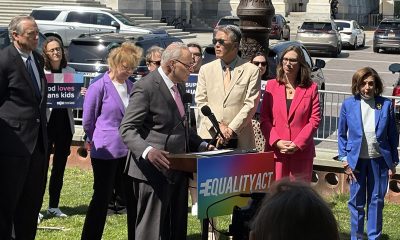National
GOP candidate seeks LGBT help in ousting Pelosi
Dennis wins Log Cabin endorsement, faces uphill battle

The Republican candidate running against Rep. Nancy Pelosi (D-Calif.) is looking for help from LGBT voters in his quest to unseat the House speaker.
John Dennis, in his first run for political office, is running against Pelosi to represent California’s 8th congressional district. He’s described on his website as “an accomplished businessman and entrepreneur” as well as “a pro-liberty San Franciscan.”
Dennis has earned the endorsement of the Log Cabin Republicans and last week spoke at the organization’s annual dinner in D.C. to cultivate support among gay Republicans.
During his remarks, the Republican candidate said one thing he was delighted to discover over the course of his campaign is that gay rights pioneer Harvey Milk supported Republican candidate Barry Goldwater in his 1964 bid for the presidency against then-President Lyndon Johnson.
“On the surface, it doesn’t make sense, but if you think about the pre-Stonewall era, it makes complete sense,” Dennis said. “The community had a tough time with government. Government was oppressing it and always on its back. But Barry’s libertarian streak actually connected with the community.”
Dennis emphasized the libertarian elements of the GOP and said those tenets mean the LGBT community “rightfully belongs in the Republican Party with our emphasis on individual liberty.”
Dennis said he’s running against an opponent who represents Democratic control of Washington and dissatisfaction with the federal government.
He said he’s noticed a lot of e-mails from Republican challengers saying their Democratic opponents vote either 94 percent of the time or 96 percent of the time with Pelosi.
“I can guarantee you one thing,” Dennis said. “My opponent votes 100 percent of the time with Nancy Pelosi.”
Dennis spoke with the Blade about his support for LGBT issues following his speech at the Log Cabin dinner. Pelosi hasn’t scheduled a time to talk with the Blade during the 111th Congress despite repeated requests for an interview over the past year.
Among Dennis’ pro-LGBT positions is his support for repeal of laws seen as discriminatory against LGBT people. He said he backs repeal of “Don’t Ask, Don’t Tell” as well as the Defense of Marriage Act.
“I don’t think marriage is a government issue,” he said. “It’s certainly not a federal government issue. So, those are issues that I’d be happy to support in the gay community.”
Dennis also said in 2008 he voted against Proposition 8 in California, which ended same-sex marriage in the state. He said his position against Prop 8 is consistent with his view that government should not be in “the marriage business.”
“It was very exclusionary, that law, and didn’t go to solve the problem,” Dennis said. “It just said, ‘OK, well, this is for us and then you guys do whatever you’re going to do.’ And I thought it was a little aggressive.”
Dennis added he thinks U.S. District Court Judge Vaughn Walker’s recent ruling that Prop 8 is unconstitutional was “the right decision” and said he expressed his support for the ruling on his blog.
Still, Dennis hesitated when asked if he supports the Employment Non-Discrimination Act, which would bar job discrimination against LGBT people in most settings.
Dennis said his support on ENDA will depend on how the legislation “is presented” and said there’s a “flip-side” to the legislation.
“Do you end up forcing homophobes or anti-homosexual groups — do you end up protecting their right to be employed by homosexuals when there’s an obvious conflict there?” Dennis said. “So, it depends on how it’s worded. But, you know, I’m … against discrimination.”
Dennis emphasized his credentials as a Republican and said he wants to stop the “fiscal irresponsibility of Washington.”
“We need to get spending under control,” he said. “We need to balance our budgets. We need to start following the Constitution, and only spend on what the Constitution authorizes the Congress to spend on.”
Dennis said in the primary he ran as a “pro-civil liberties, anti-war, pro-legalization Republican” and won, so he doesn’t think he has “anything to prove to anyone” regarding his place in the Republican Party.
Log Cabin endorsed Dennis on Sept. 16 as part of a group 11 Republican candidates seeking House seats.
Other endorsements included Rep. Judy Biggert (R-Ill.), who voted for an amendment to end “Don’t Ask, Don’t Tell,” and Rep. Ileana Ros-Lehtinen (R-Fla.), a co-sponsor of numerous pro-LGBT bills.
R. Clarke Cooper, Log Cabin’s executive director, said Dennis’ support for ending “Don’t Ask, Don’t Tell” was a major factor in the organization’s decision to endorse the Pelosi challenger.
“Bottom line is John Dennis is a pro-repeal Republican candidate,” Cooper said. “So he is on our radar screen and we are supporting him as well some other incumbents and candidates who would be a good force-multiplier in the party and help us get the party to be more inclusive toward gays and lesbians.”
Cooper said Dennis has been an “active ally” of the Log Cabin Republicans of San Francisco and has recruited numerous chapter members into his campaign.
Despite his support for LGBT issues, Dennis is running against a lawmaker who for decades has been seen as a stalwart supporter of LGBT people.
Drew Hammill, a Pelosi spokesperson, emphasized the speaker’s record on pro-LGBT legislation.
“Speaker Pelosi has been a staunch advocate for the LGBT community in her more than 20 years in the Congress; helping lead the fight against HIV/AIDS, opposing efforts to enshrine discrimination in the United States Constitution and served as a leading voice against Proposition 8 in California,” Hammill said.
Hammill said Pelosi led efforts to pass hate crimes legislation as well as pass legislation in the House to repeal “Don’t Ask, Don’t Tell.” Hammill said the speaker “will keep pushing for action on ENDA.” Pelosi is being honored with an award from the Gay & Lesbian Victory Fund this week in Washington for her work on LGBT issues.
“San Franciscans know Nancy Pelosi’s commitment to fostering equality and ending discrimination,” Hammill said.
But one group that has criticized Pelosi for not moving forward with a House vote on ENDA is washing its hands of the race.
Robin McGehee, co-founder of GetEQUAL, which has staged acts of civil disobedience throughout the country over Pelosi’s inaction this Congress over ENDA, said voters in the speaker’s district should “determine for themselves how well she is representing [them] and fighting for their equality.”
“Our equality knows no political party; we are not beholden to the Democratic Party or the Republican Party,” McGehee said. “Whoever wins the election can expect us to hold them accountable on their commitments to the LGBT community.”
Dennis faces an uphill fight to unseat Pelosi -— to say the least — in the Democratic stronghold of California’s 8th congressional district, which includes San Francisco. Members of the Green Party often fare better than Republicans in the district.
Pelosi has consistently won election in the area since she first sought a U.S. House seat in 1988. Pelosi often wins these races with more than 80 percent of the vote.
Dennis also has major deficit against Pelosi in terms of fundraising. The speaker has raised nearly $2 million this campaign cycle while Dennis has $650,000, according to the most recent Federal Election Campaign reports.
Pelosi has $214,000 in cash on hand while Dennis has $58,000. Pelosi also has no campaign debt while Dennis has $53,000.
Still, Dennis said he sees a path to victory because his internal polling numbers show that Pelosi’s support is growing soft among independents and Democrats.
“If we win all the votes of people who say they won’t vote for her, plus have a good turnout for the Republicans, we’ll actually have enough votes to defeat her,” Dennis said.
Cooper acknowledged that Dennis is facing an “uphill battle” and said he thinks the Republican candidate realizes the challenge.
Still, Cooper said he thinks Pelosi could be vulnerable because of the number of House Democrats who are distancing themselves from Pelosi in campaign ads.
“There are Democrats trying to maintain their seats who don’t want her to come into their district, they don’t want her support and they don’t want to look like they’re affiliated with her as speaker even though they’re running as a Democrat,” Cooper said.
During his speech, Dennis acknowledged that running in San Francisco is “challenging” for a Republican and said he has to do “special things” to build support.
A recent web ad from the Dennis campaign depicts Pelosi as the Wicked Witch of the West from “The Wizard of Oz” and criticizes her for leading the way in what the ad describes as rampant spending in Washington and burdensome taxation.
“It went viral,” Dennis said. “We were mentioned in a lot of shows. Jay Leno included us in his monologue. It’s been seen about 630,000 times. And I will say that there is a coven of witches in … New Jersey that vehemently oppose us over this.”
Dennis noted that he received the Log Cabin endorsement right after the publication of the ad, which he said shows, “I really am a friend of the Friends of Dorothy.”
Federal Government
UPenn erases Lia Thomas’s records as part of settlement with White House
University agreed to ban trans women from women’s sports teams

In a settlement with the Trump-Vance administration announced on Tuesday, the University of Pennsylvania will ban transgender athletes from competing and erase swimming records set by transgender former student Lia Thomas.
The U.S. Department of Education’s Office for Civil Rights found the university in violation of Title IX, the federal rights law barring sex based discrimination in educational institutions, by “permitting males to compete in women’s intercollegiate athletics and to occupy women-only intimate facilities.”
The statement issued by University of Pennsylvania President J. Larry Jameson highlighted how the law’s interpretation was changed substantially under President Donald Trump’s second term.
“The Department of Education OCR investigated the participation of one transgender athlete on the women’s swimming team three years ago, during the 2021-2022 swim season,” he wrote. “At that time, Penn was in compliance with NCAA eligibility rules and Title IX as then interpreted.”
Jameson continued, “Penn has always followed — and continues to follow — Title IX and the applicable policy of the NCAA regarding transgender athletes. NCAA eligibility rules changed in February 2025 with Executive Orders 14168 and 14201 and Penn will continue to adhere to these new rules.”
Writing that “we acknowledge that some student-athletes were disadvantaged by these rules” in place while Thomas was allowed to compete, the university president added, “We recognize this and will apologize to those who experienced a competitive disadvantage or experienced anxiety because of the policies in effect at the time.”
“Today’s resolution agreement with UPenn is yet another example of the Trump effect in action,” Education Secretary Linda McMahon said in a statement. “Thanks to the leadership of President Trump, UPenn has agreed both to apologize for its past Title IX violations and to ensure that women’s sports are protected at the university for future generations of female athletes.”
Under former President Joe Biden, the department’s Office of Civil Rights sought to protect against anti-LGBTQ discrimination in education, bringing investigations and enforcement actions in cases where school officials might, for example, require trans students to use restrooms and facilities consistent with their birth sex or fail to respond to peer harassment over their gender identity.
Much of the legal reasoning behind the Biden-Harris administration’s positions extended from the 2020 U.S. Supreme Court case Bostock v. Clayton County, which found that sex-based discrimination includes that which is based on sexual orientation or gender identity under Title VII rules covering employment practices.
The Trump-Vance administration last week put the state of California on notice that its trans athlete policies were, or once were, in violation of Title IX, which comes amid the ongoing battle with Maine over the same issue.
New York
Two teens shot steps from Stonewall Inn after NYC Pride parade
One of the victims remains in critical condition

On Sunday night, following the annual NYC Pride March, two girls were shot in Sheridan Square, feet away from the historic Stonewall Inn.
According to an NYPD report, the two girls, aged 16 and 17, were shot around 10:15 p.m. as Pride festivities began to wind down. The 16-year-old was struck in the head and, according to police sources, is said to be in critical condition, while the 17-year-old was said to be in stable condition.
The Washington Blade confirmed with the NYPD the details from the police reports and learned no arrests had been made as of noon Monday.
The shooting took place in the Greenwich Village neighborhood of Manhattan, mere feet away from the most famous gay bar in the city — if not the world — the Stonewall Inn. Earlier that day, hundreds of thousands of people marched down Christopher Street to celebrate 55 years of LGBTQ people standing up for their rights.
In June 1969, after police raided the Stonewall Inn, members of the LGBTQ community pushed back, sparking what became known as the Stonewall riots. Over the course of two days, LGBTQ New Yorkers protested the discriminatory policing of queer spaces across the city and mobilized to speak out — and throw bottles if need be — at officers attempting to suppress their existence.
The following year, LGBTQ people returned to the Stonewall Inn and marched through the same streets where queer New Yorkers had been arrested, marking the first “Gay Pride March” in history and declaring that LGBTQ people were not going anywhere.
New York State Assemblywoman Deborah Glick, whose district includes Greenwich Village, took to social media to comment on the shooting.
“After decades of peaceful Pride celebrations — this year gun fire and two people shot near the Stonewall Inn is a reminder that gun violence is everywhere,” the lesbian lawmaker said on X. “Guns are a problem despite the NRA BS.”
New York
Zohran Mamdani participates in NYC Pride parade
Mayoral candidate has detailed LGBTQ rights platform

Zohran Mamdani, the candidate for mayor of New York City who pulled a surprise victory in the primary contest last week, walked in the city’s Pride parade on Sunday.
The Democratic Socialist and New York State Assembly member published photos on social media with New York Attorney General Letitia James, telling followers it was “a joy to march in NYC Pride with the people’s champ” and to “see so many friends on this gorgeous day.”
“Happy Pride NYC,” he wrote, adding a rainbow emoji.
Mamdani’s platform includes a detailed plan for LGBTQ people who “across the United States are facing an increasingly hostile political environment.”
His campaign website explains: “New York City must be a refuge for LGBTQIA+ people, but private institutions in our own city have already started capitulating to Trump’s assault on trans rights.
“Meanwhile, the cost of living crisis confronting working class people across the city hits the LGBTQIA+ community particularly hard, with higher rates of unemployment and homelessness than the rest of the city.”
“The Mamdani administration will protect LGBTQIA+ New Yorkers by expanding and protecting gender-affirming care citywide, making NYC an LGBTQIA+ sanctuary city, and creating the Office of LGBTQIA+ Affairs.”




















